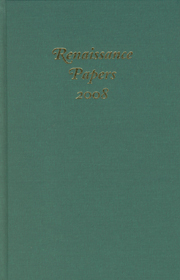Book contents
- Frontmatter
- Contents
- Renaissance Papers
- Cardinal Wolsey: The English Cardinal Italianate
- Pope Gregory and the Gens Anglorum: Thomas Stapleton's Translation of Bede
- The Spenserian Paradox of Intended Response
- Lucan, Marlowe, and the Poetics of Violence
- Hell Is Discovered
- Private and Public Plays in the Private Theaters: Speculation on the Mercenary Methods of Second Paul's and Second Blackfriars
- Staging Dismemberment in Early Modern Drama: Playing Mnemonics and Meaning
- Serving Theater in Volpone
- Troilus and Cressida: An Epitaph for the History Play
- “What thing thou art, thus double-formed”: Naming, Knowledge, and Materialism in Paradise Lost
Lucan, Marlowe, and the Poetics of Violence
Published online by Cambridge University Press: 12 September 2012
- Frontmatter
- Contents
- Renaissance Papers
- Cardinal Wolsey: The English Cardinal Italianate
- Pope Gregory and the Gens Anglorum: Thomas Stapleton's Translation of Bede
- The Spenserian Paradox of Intended Response
- Lucan, Marlowe, and the Poetics of Violence
- Hell Is Discovered
- Private and Public Plays in the Private Theaters: Speculation on the Mercenary Methods of Second Paul's and Second Blackfriars
- Staging Dismemberment in Early Modern Drama: Playing Mnemonics and Meaning
- Serving Theater in Volpone
- Troilus and Cressida: An Epitaph for the History Play
- “What thing thou art, thus double-formed”: Naming, Knowledge, and Materialism in Paradise Lost
Summary
All great things crush themselves; such end the gods
Allot the height of honour.
—Lucan's First Book, 81–821IN several charged passages in Hero and Leander, Marlowe incorporates details that derive from his translation of Lucan's Civil Wars. Millar Maclure identifies three parallels between these works in the Revels edition of Marlowe's poems and translations. Where Maclure, however, is interested in identifying isolated verbal echoes insofar as such echoes evince a distinctively Marlovian turn of phrase, I am interested in the programmatic effects of Marlowe's deliberate returns to a prior text. With unvarying pressure, these returns inform those passages in Hero and Leander that associate love's force with cosmic disorder. Each passage marks a crucial moment in the narrative of love; each, as this essay will demonstrate, also marks the poet's authority. The first passage (1.97–102) describes the strangely galvanic atmosphere in which Hero and Leander meet; the second (1.188–91) conveys the elements' preternatural response to that meeting; the third (2.287–93) associates Hero and Leander's consummation of their love with elemental strife. In these passages, Marlowe does not merely recycle phrases that he had originally formed in Lucan's First Book for the sake of literary economy. He yokes his exploration of erotic passion in Hero and Leander to the universal violence that is at once Lucan's subject matter and his method. Alluding in Hero and Leander to Lucan's furious text, Marlowe presents himself as a new Lucan: a poet who defines his relationship with the literary past as an exercise in violent reversals.
- Type
- Chapter
- Information
- Renaissance Papers 2008 , pp. 47 - 64Publisher: Boydell & BrewerPrint publication year: 2009



